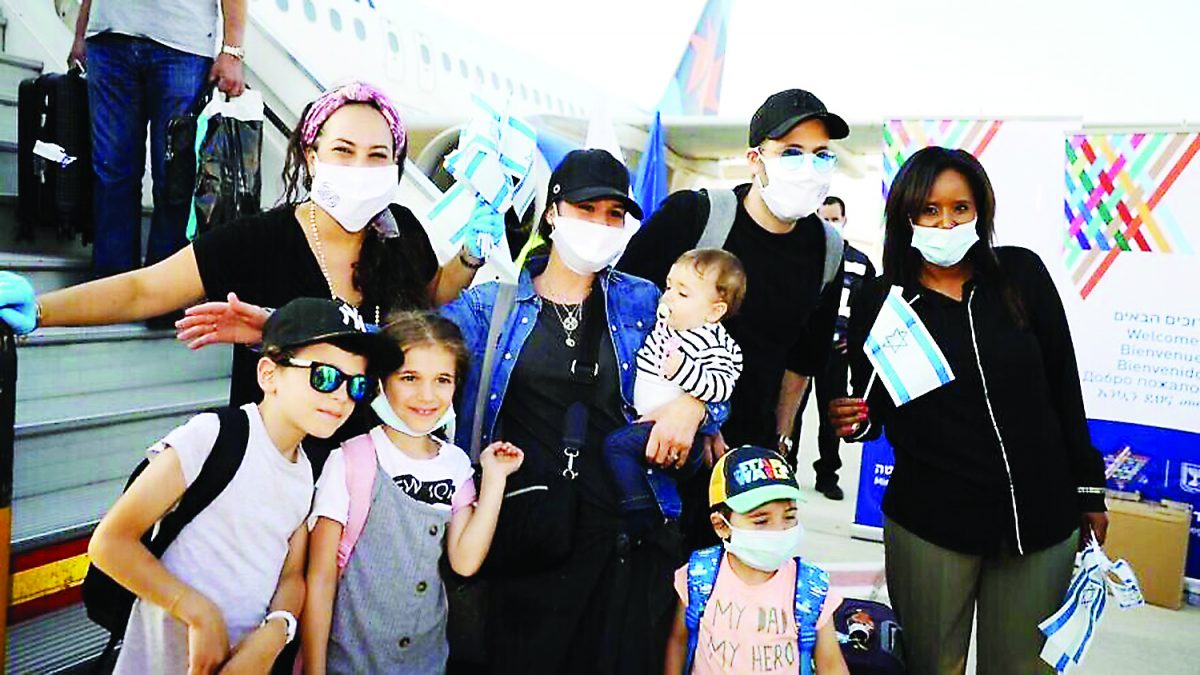
Featured Item

South Africans stream to Israel, even under lockdown
Published
4 years agoon
A hundred South Africans have made aliyah since lockdown began in March, as South Africa’s economic and political future remain a strong “push factor” for Jews leaving these shores.
They join a further hundred South Africans who headed to Israel this year before the pandemic. At this pace, up to 600 South African Jews could make aliyah by the end of the year.
Expensive and long lockdown flights, gruelling bureaucracy, quarantine on arrival, and a difficult job market in the face of coronavirus haven’t stopped South Africans heading to Israel.
“We have had four aliyah flights from South Africa under lockdown, and we are in the process of organising a fifth flight,” says Liat Amar Arran of the Israel Centre in Johannesburg.
“Each flight has taken 20 to 30 South Africans emigrating to Israel.” She says most of these people were in the process of making aliyah before COVID-19, and were delayed due to the lockdown.
A few made the decision to settle in Israel since lockdown began, but struggled with the bureaucracy of obtaining relevant documents. Nevertheless, some of these have already made it onto the repatriation flights.
Dorron Kline, the chief executive of Telfed (the South African Zionist Federation in Israel that assists in the absorption of South African olim), says that since the beginning of 2020, 204 people have made aliyah from South Africa. This is 108 “units” of people including 40 spouses and 56 children.
“These numbers don’t include people who, while they are in Israel, make aliyah outside of the Jewish Agency framework by going directly to the ministry of absorption,” he notes.
He says the aliyah numbers at the moment really depend on the number of flights. “So far this month [August], we welcomed 28 olim from South Africa from one flight. If there is another flight, we will pass the number 50.
“All aliyah numbers are down because of COVID-19 and the lack of flights,” he says. “When flights are available, people come. If people cannot get their documents organised because of the lockdown, then the numbers will go down. However, if the government opens its offices and provides documents, then 600 olim per year from South Africa is a realistic estimate.”
Official Telfed statistics show that only 188 people made aliyah from South Africa in 2002, dropping to 92 in 2004. It peaked at about 335 a year in 2008 and 2009, before dropping again slightly. Five years ago, 231 people emigrated from South Africa to Israel. This has steadily increased every year since, with 346 making aliyah from South Africa in 2018 and 416 people making aliyah from South Africa in 2019.
Even before the lockdown, Israel was the first choice for South African emigrants. According to the Jewish Community Survey of South Africa 2019 conducted by the Isaac and Jessie Kaplan Centre for Jewish Studies at the University of Cape Town, 32% of community members said it was likely they would settle in Israel. Of the 43% that said they considered emigrating, the preferred destination was Israel (51%).
Kline says people aren’t making aliyah just because they want to leave South Africa. “The Zionist feelings are there. However, the ‘push’ factors are growing, and explain the increase in aliyah numbers.”
Jawitz Properties Chief Executive Herschel Jawitz says that he has seen a number of South African families leave, and most are choosing to go to Israel. “The emigration trend isn’t only related to the lockdown, but the economic consequences of the lockdown. Families who were thinking about making aliyah have moved from thinking to going based on factors such as work prospects and the economy.
“If things are going to be tough here for a long while to come, the sentiment is ‘we may as well go and tough it out in Israel’,” Jawitz says. “The families making aliyah encompass a broad spectrum in terms of wealth, religious observance, and stage of life. This isn’t just people retiring or those who have real financial means. Israel’s gain will continue to be our loss.”
However, his colleague, Joel Harris, a Jawitz estate agent in the Glenhazel area, says property sales have slowed down. “There was a massive exodus from July last year until January this year, and most went to Israel. I think the lockdown has slowed people’s arrangements, or made them re-think things, and a few have decided to stay. It’s clear that for every Jew that’s leaving, one is staying, and buying property.”
Harris has worked in the Glenhazel area for 29 years, and says emigration comes in cycles every five years or so. There will usually be about six months of emigration, peaking in June or July as people want to get kids into schools overseas by September. “There are always going to be people leaving, but for me, this period hasn’t been more volatile. I thought there would be a massive influx of stock due to emigration and financial pressure. Is it still coming? Time will tell.”
Arran says it’s difficult to compare current aliyah numbers from South Africa to those of other countries over the past five months because each country is facing particular challenges regarding repatriation flights during COVID-19.
According to an article in the British Jewish Chronicle on 28 May, the chairperson of the Jewish Agency, Isaac Herzog, predicted that Israel would enjoy a boom in aliyah in the wake of the coronavirus crisis. He also said that there was “no doubt” that the country would see “a big wave in aliyah” shortly, as Israel’s situation was better than elsewhere.
“We are talking about a lot of potential new olim who have academic degrees and important skills that will for sure contribute to Israeli society,” he said. And he expected that wave of aliyah from the United States, South Africa, and Australia in particular.
A 32-year-old man, speaking on condition of anonymity, described making aliyah on an Ethiopian Airlines repatriation flight on 5 August. His ticket was originally booked for the end of April 2020. He decided to make aliyah before the virus hit our shores. “I was looking for a change, had no commitments, most of my best friends have emigrated, and I found Israel to be an easier, more supportive country to move to. South Africa as a country … I felt I was going backwards.”
He was told a week and a half prior to leaving that he could get onto a repatriation flight. “There was lots of documentation to organise in just two weeks: questionnaires, health declarations, an affidavit from the police station, and getting my visa renewed. It was all quite daunting.
“The route of travel was Cape Town – Johannesburg – Addis Ababa – Tel Aviv. I had to make my own way to Johannesburg, which I did on a domestic flight.” He describes long queues, checking of documents, waiting around, extremely quiet and closed airports, and even a canine unit sniffing his bags before he made it to Ben Gurion Airport. He was then taken to a hotel to begin his two-week quarantine period.
“I’m fortunate to be at the Dan Panorama Hotel in Tel Aviv. I was mentally prepared that [the repatriation flight] wouldn’t be a smooth transition, but I’m fortunate that I was able to take it. It’s a weird, surreal feeling, but I’m glad I did it.”










